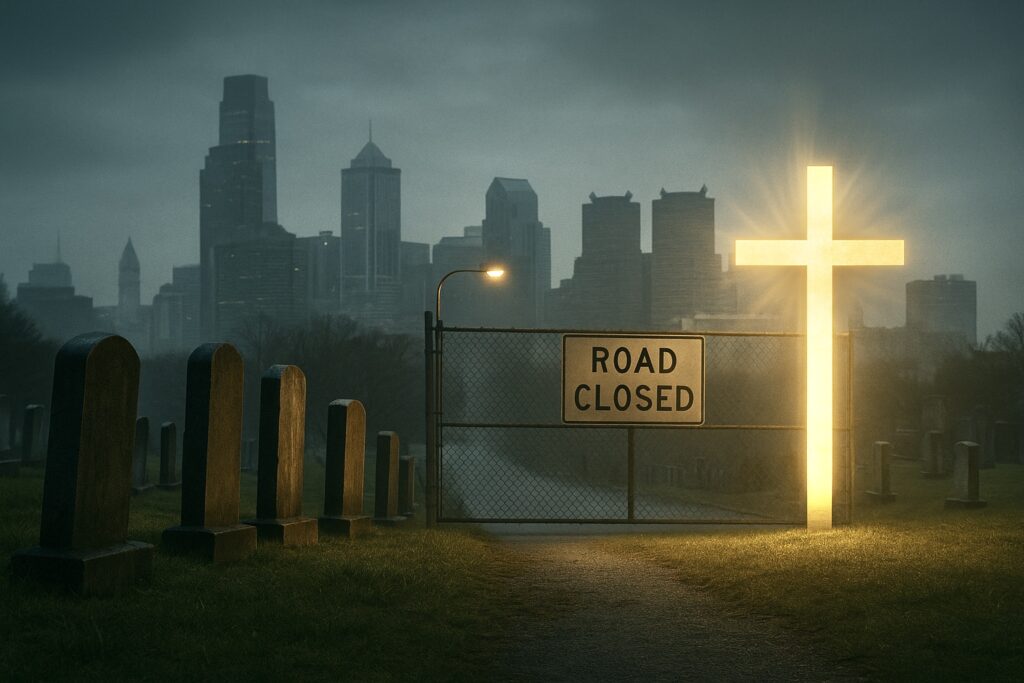文/HuSir
大洋国的人自古至今最深的焦虑,并非贫穷,也非权力,而是对死亡的恐惧。儒、释、道三家虽各有安身立命之说,却都在“如何延长生命”与“如何逃避死亡”上用尽心思。儒家讲“立德立功立言”,道家修“长生久视”,佛教追“涅槃不灭”,无一不是在用人力与思想对抗生命的有限性。可悲的是,这些努力最终都没有带来超越性的确信,而只是让人更深陷在“求生”与“畏死”的循环之中。
这种恐惧并非生理层面的,而是文化性的——大洋国文化自古缺乏对永恒的信仰。没有天堂的确据,就只有帝王的权威;没有救赎的盼望,就只有权力与荣誉的替代品。于是人们相信,只要顺从皇帝、俯首称臣,就能“保全性命”;只要遵从权威,就能换取安稳。这种“苟活哲学”延续千年,从臣民心理、科举制度到现代体制,构成了一个巨大而稳定的精神结构:以恐惧为核心的社会秩序。
而基督信仰恰恰从根本上颠覆了这种秩序。耶稣对她说:“复活在我,生命也在我;信我的人,虽然死了,也必复活。(约翰福音 11:25 和合本),这不是一句宗教安慰,而是对死亡统治的彻底宣告。一个真正理解死亡的人,才第一次拥有了自由。因为他知道:死亡不是终结,而是通向永恒的门。只有明白死后归向何处,人才会珍惜活着的每一天,甘心为真理、为爱、为公义而献身。

这种恐惧在疫情三年中达到了顶点。人们在封控下为了一口气而彼此举报、为一张通行证而下跪求情;医护人员因上级命令隐瞒病情;老人死于被锁的门后,而邻居却不敢敲门相助。那些举着“要自由”的人被压倒在地,而更多的人在窗台上齐声唱着“感谢政府”。甚至一些教会也关上了门,把顺从政策当作“爱邻舍”的表现,却忘记了信仰的本质是以真理为光照亮恐惧。当生命的价值被恐惧取代,人们不再思考“何为生命”,而只关心“如何不死”。
大洋国的问题正是在这里:人们追求长生,却不敢面对死亡;害怕失去,却从未真正拥有。于是,在面对权力时,他们选择跪下;在面对不公时,他们选择沉默;在面对真理时,他们选择回避。甚至信主后,许多大洋国基督徒依然保留这种文化性惧怕:他们信耶稣,却不敢活出信仰;他们读圣经,却不敢以真理为尺度来审视世界。他们所畏惧的,不再是肉体的死亡,而是社会的排斥与人群的目光。
如果一个民族无法直面死亡,它也永远无法直面真理。真正的自由,不是身体的逃离,而是灵魂对永恒的确信。当一个人确知自己的归宿,他的生命便不再受恐惧驱动,而是由爱所推动。他的顺服不再是出于畏惧,而是出于感恩;他的行动不再是为求生,而是为荣耀神。
因此,大洋国的问题不是政治先天的,而是灵魂的后天残缺;不是没有自由的制度,而是没有确信的信仰。当大洋国的人真正理解“死亡已被基督胜过”的意义,恐惧的锁链才会松开,俯首称臣的本能才会消失,追求自由的灵魂才会复活。
The Nation That Fears Death: From the Philosophy of Survival to the Tragedy of Faithlessness
By HuSir
The deepest anxiety of the people of Oceania has never been poverty or power—it has always been the fear of death.
Confucianism, Buddhism, and Daoism each offer their own doctrines of living and dying, yet all revolve around one obsession: how to prolong life and how to escape death.
Confucianism teaches the pursuit of virtue and legacy (“to establish virtue, achievements, and words”); Daoism seeks longevity; Buddhism aspires to “nirvana without extinction.”
All are human attempts to resist the limits of life.
Tragically, none of these efforts bring true assurance of transcendence.
Instead, they deepen the endless cycle of “striving to live” and “fearing to die.”
This fear is not biological—it is cultural.
Oceania’s civilization has long lacked a belief in eternity.
Without the certainty of heaven, people have only the emperor’s authority; without the hope of salvation, they cling to power and honor as substitutes.
Thus they came to believe: as long as one bows before the ruler, life can be preserved; as long as one obeys authority, peace can be secured.
This philosophy of mere survival—“to live at any cost”—has persisted for millennia.
From the psychology of subjects and the imperial examination system to the modern bureaucratic order, it has formed a vast and stable spiritual structure: a social order built upon fear.
Christian faith, however, overturns this order at its very foundation.
Jesus said to her, “I am the resurrection and the life. He who believes in Me, though he may die, he shall live. (John 11:25 NKJV)
This is not a comforting metaphor—it is a declaration of victory over the reign of death.
Only when one truly understands death can one be free for the first time.
For then one knows: death is not an end, but a doorway to eternity.
Only those who are certain of where they are going after death can truly cherish every day of life—willing to give themselves for truth, love, and justice.
This fear reached its climax during the three years of the pandemic.
Under lockdown, people reported their neighbors just to breathe another day; some knelt for travel permits; doctors concealed cases under official orders; the elderly died behind locked doors while neighbors dared not knock.
Those who cried “We want freedom” were crushed to the ground, while crowds on their balconies sang in unison, “Thank you, government.”
Even many churches closed their doors, mistaking submission to policy for “loving one’s neighbor,” forgetting that faith’s essence is to let truth cast out fear.
When the value of life is replaced by fear, people cease asking “What is life?” and only care about “How not to die.”
Here lies the true problem of Oceania:
People strive for longevity but dare not face death; they fear loss yet have never truly possessed anything.
Thus, when confronted with power, they kneel; when faced with injustice, they remain silent; when confronted with truth, they look away.
Even after coming to Christ, many believers in Oceania retain this cultural fear: they believe in Jesus but dare not live their faith; they read the Bible but dare not use truth to measure the world.
What they now fear is no longer physical death, but social exclusion and human judgment.
If a nation cannot face death, it will never face truth.
True freedom is not the escape of the body, but the assurance of the soul in eternity.
When one knows one’s destination, life is no longer driven by fear but by love.
Obedience then flows not from dread, but from gratitude; action arises not from the will to survive, but from the desire to glorify God.
Therefore, the tragedy of Oceania is not a political flaw but a spiritual deformity;
not a lack of external liberty, but the absence of inner conviction.
When the people of Oceania finally understand that “death has been conquered by Christ,” the chains of fear will loosen, the instinct to bow will fade, and the soul that longs for freedom will rise again.

发表回复